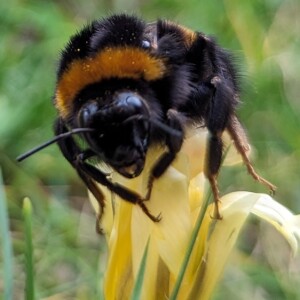Not Waving But Struggling
A neat little parable about the effect of the human species on the rest of the natural world, clinging to the rain-ravaged crocus just outside our door. Almost certainly this is Bombus terrestris, the buff-tailed bumble bee one of the largest, earliest to emerge and commonest of the eusocial bee species. They are called 'eusocial' - rather that 'social', like honeybees - because they create a nest, and occupy it as a social colony, consisting of a single queen, with her offspring workers and drones. However, unlike honeybees, the colony does not persist through the winter; only newly-bred queens survive, hibernating through the cold months and emerging to create their own new colonies next spring
This one has, I think, been fooled into breaking her sleep by the succession of warm days we have had. I went outside before dawn in shirtsleeves this morning and felt not at all cold. But there is not enough forage available, and the days are not long enough for her to start anew. By the time I took this picture in late afternoon, a cold front had passed over and the temperature was falling rapidly (I was able to reproduce my hedge-and-rainbow picture from a couple of days ago). She was exhausted and close to motionless, incapable of flight, likely to perish overnight. Can we put the unseasonal warmth down to climate breakdown? It's not that simple, but we have certainly made our contribution
The buff-tail is one of the commonest bee species, and found world-wide, partly because we have bred them commercially and transported them to many countries as a pollinator species in glasshouses and polytunnels. They are particularly used for tomatoes. So we boost the species by our actions with one hand, and damage its environment, endangering its survival, with the other. I moved her to the woodpile, in the hope that she will settle down until spring is really here


Comments
Sign in or get an account to comment.


